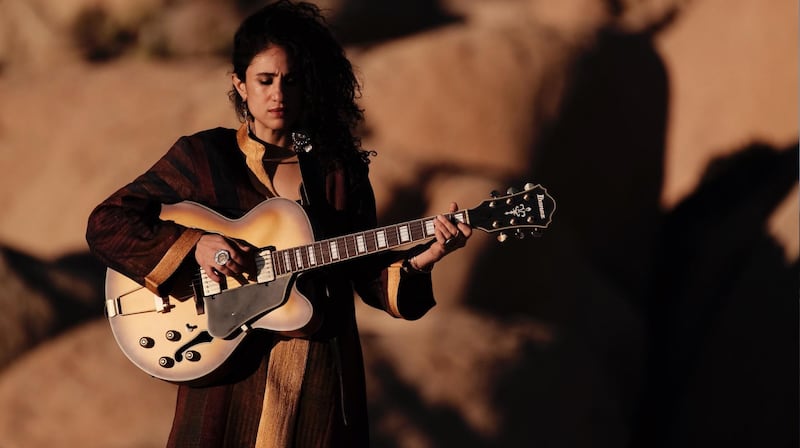For Lebanese-American singer Naima Shalhoub, activism is synonymous with music. As the daughter of refugees from Lebanon, she is familiar with political struggle.
Shalhoub was hoping to visit Beirut this year to play music and join the anti-government protests that have swept across her country. Although the coronavirus pandemic put those plans on hold, she has been continuing her activism from the US, working mainly within the realms of restorative justice.
Many artists, including Frank Sinatra, Johnny Cash and B B King, performed some of their most emotive music for prisoners. Shalhoub has played in prisons, too. It began when she started holding concerts and music workshops in San Francisco County Jail. In 2015 she recorded a live album there.

Shalhoub says her first studio album, Siphr, is now ready for release. She came up with the idea for the collection when she was living in Beirut for a year in 2018. She played gigs there and the city spurred her creativity, she says.
“For me, music has always been connected to social movements, to justice, to freedom and so as a Lebanese-American I wanted to really use that opportunity to uplift what is happening in Lebanon because there are so many incredible people who are really fighting the good fight,” she says.
Siphr is Arabic for "zero", but for Shalhoub it is more than a word. The singer spent time researching its symbolism, a revolutionary concept from Arab mathematics, seeing it as a circle that holds us all, that encompasses beginnings and endings, nothing and everything.

When she mentioned the concept to her friend Tarik Kazaleh, the Palestinian-American musician and MC known as Excentrik, he immediately agreed to produce it. The album is meant to represent “wholeness”, with each of its nine tracks serving as interconnected parts. Each is named after a number and the album segues between songs in a way that makes it easy to listen to on repeat.
"In my prior work, I would really focus on a very clear but narrow social message," Shalhoub says. "But with this album, I wanted to bring all the layers that are within myself to it. It's one thing to heal internally and individually within communities. It's another to have healing externally, requiring a complete transformation of the political system. Those themes are definitely in the album – the internal and external, and tension between the two."
Shalhoub has an eclectic taste in music, ranging from Tuareg group Tinariwen from Mali to neo-soul greats such as Erykah Badu and Lauryn Hill.
"I grew up listening to soul music, to rhythm and blues, and as a young vocalist I fell in love with Billie Holiday and Ella Fitzgerald. But my parents did not listen to any of that. They listened to Arabic music. I was in these two worlds, so a lot of my style is influenced by both."

The new album's lead single, Two (Rivers in the Desert), features guitar inspired by Gnawa music from North Africa. Meanwhile, Five (The Calling) is propelled by soulful piano chords and vocal harmonies. Six (Distraction Suite) is built around three distinct musical segments. Contemplating how we deal with distraction, the track starts with intense free-jazz, before moving to a soulful blues section before the bass-heavy intensity resumes.
Another track, Eight (Arab-Amerikkki) is an Arabic hip-hop song with verses rapped by Excentrik and a hook written by Shalhoub, inspired by recent unrest in the Middle East and the US, and prejudice in America towards people from Arab countries.
Perhaps a stand-out on the album is Four (Roumieh Prison Blues), which features lyrics written by men incarcerated at the notorious jail in Lebanon. The song serves as a reflection on human struggle. After visiting the prison with drama therapist and performing artist Zeina Daccache, Shalhoub built a melody around the lyrics by the male inmates.
Shalhoub says blues music has always resonated with her; she finds that its musicality and tonality work well with Arabic vocals. Inspired by novelist and civil rights activist James Baldwin's essay The Uses of the Blues, Shalhoub decided to write the song over a 12-bar blues melody.
“The song translates ‘struggle knows struggles and resilience knows resilience’,” she says. “It does not matter if the blues originated in a black American context, in this context that same essence of creativity, innovation and reclaiming one’s narrative through music is felt.”

Shalhoub was inspired by Daccache, who in 2007 founded Lebanon's first drama therapy centre, Catharsis, which uses theatre to empower disadvantaged people and lobby for policy change. Inmates write stories and plays about their experiences, particularly about unjust laws and the stigma around mental health.
After establishing Catharsis, Daccache invited government officials inside the prison to watch them perform and they were moved.
“Two penal codes changed due to this work, which is mind-blowing to me because that is not easy to do in Lebanon or in many places for that matter,” Shalhoub says. “Even though the contexts are very different, there has always been international solidarity among political prisoners. It was important for me to go and learn and so the men wrote the lyrics, I put them in the melody and we sang it together in our two-hour session.
“It was so powerful, I’ll never forget leaving Roumieh Prison and then all of a sudden hearing the song coming from the walls and I turn around and all the men in the prison are singing that song.”
When Shalhoub is not writing and performing songs, she works with a non-profit organisation called Restorative Justice for Oakland Youth and holds weekly healing circles with women and girls of colour. Shalhoub has also worked in Oakland, California, public schools for several years as restorative justice co-ordinator. Alongside this, the singer-songwriter engages in activism, plays music for theatre productions, fundraisers and presents at international conferences.
Shalhoub says her views come from “an abolitionist standpoint”, when it comes to incarceration and really committing to imagining a world without prisons.
“When I went to the county jail in San Francisco, the reasons people were in jail were due to poverty and racism – things that we should, as society, be able to intervene in.”
With global inequalities underscored by the coronavirus pandemic, Shalhoub hopes her new album will inspire systemic change as well as personal change.
Naima Shalhoub’s debut album 'Siphr' comes out on Thursday, August 6






